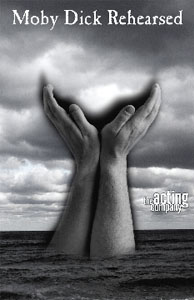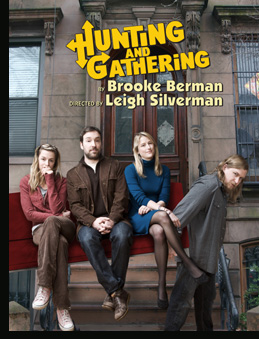“One should not play for the people who sit in the front row–they are usually ‘dead-heads,’ but play for those up in the gallery that pay ten pfennigs for their tickets; they should not only hear, but they should see.”
Franz Liszt (quoted in Carl Lachmund, Living with Liszt)
Archives for February 2008
TT: Southward bound
 My flight to San Francisco was uneventful, and so was my drive from the airport to Berkeley, thanks to the GPS receiver that Mrs. T gave me for Christmas. It showed me exactly how to get to my hotel, which is located a few hundred yards from San Francisco Bay, and I did exactly what it told me to do. Once I got there, I did as little as possible, save for dining with a friend and taking her to a play that I’ll be reviewing in Friday’s Wall Street Journal. The rest of the time I read, listened to music, worked on Rhythm Man: A Life of Louis Armstrong, caught up with my accumulated e-mail, and slept. I watched the sun set over the bay as I ate dinner on Saturday night, and felt completely content.
My flight to San Francisco was uneventful, and so was my drive from the airport to Berkeley, thanks to the GPS receiver that Mrs. T gave me for Christmas. It showed me exactly how to get to my hotel, which is located a few hundred yards from San Francisco Bay, and I did exactly what it told me to do. Once I got there, I did as little as possible, save for dining with a friend and taking her to a play that I’ll be reviewing in Friday’s Wall Street Journal. The rest of the time I read, listened to music, worked on Rhythm Man: A Life of Louis Armstrong, caught up with my accumulated e-mail, and slept. I watched the sun set over the bay as I ate dinner on Saturday night, and felt completely content.
Today I fly down to Los Angeles, where I have shows to see, people to meet, and pieces to write. I’ll be busy, but at least I’ll be busy in an exciting and unfamiliar place, and Mrs. T is waiting for me there, which will make everything more fun. Among other things, we’re going to stay in a fancy Hollywood hotel, eat hot dogs at Pink’s, and visit an art-collecting friend of mine who lives in a house designed by Frank Lloyd Wright’s son. What’s not to like?
I’ll let you know how it’s going in due course.
TT: Almanac
“The place is wide open, but not in the way that New York is wide open–vulgarly, garishly, hoggishly. The business is achieved with an air, almost a grand manner. It is good-humored, engaging, innocent. There is no heavy attitude of raising the Devil. One may guzzle as one will, but one may also drink decently and in order, and shake a leg in the style of Haydn, and lift an eye to a pretty girl without getting knocked in the head or having one’s pocket picked. It is a friendy place, a spacious and tolerant place, a place heavy with strangeness and charm. It is no more American, in the sense that American has come to carry, than a wine festival in Spain or the carnival at Nice.”
H.L. Mencken, “San Francisco: A Memory”
TT: Out the door
If you try to call me today, I probably won’t answer. I’ll be in Princeton, giving a talk called “Confessions of a Critic” at the Institute for Advanced Study. That’s the place where Albert Einstein and J. Robert Oppenheimer used to hang out–it’s located on Einstein Drive, believe it or not–and where Paul Moravec, my operatic collaborator, is currently serving as artist-in-residence.
 Tomorrow morning I depart for a week and a half in Los Angeles and California, where I’ll be seeing six shows, dining with my favorite blogger and a small but choice assortment of other friends, hitting a couple of museums, and riding the Coast Starlight with Mrs. T, who is currently taking the sun in Chandlerland.
Tomorrow morning I depart for a week and a half in Los Angeles and California, where I’ll be seeing six shows, dining with my favorite blogger and a small but choice assortment of other friends, hitting a couple of museums, and riding the Coast Starlight with Mrs. T, who is currently taking the sun in Chandlerland.
I’ll try to keep you abreast of my adventures as they happen, and in between updates I’ll leave you in the capable hands of CAAF and OGIC.
More anon.
TT: Welles and the white whale
In this week’s Wall Street Journal drama column I review two shows. One is a touring production of Orson Welles’ Moby-Dick–Rehearsed that will be seen all over America before opening in New York this May. The other is a new off-Broadway play, Hunting and Gathering. Here’s a sample.
* * *
 Founded in 1972 by John Houseman and Margot Harley, the Acting Company gives promising young actors and actresses a chance to appear in high-quality professional productions that tour throughout the U.S. Kevin Kline, Patti LuPone and David Ogden Stiers are its best-known alumni, which speaks well for its track record. The sets are simple but good, the repertory highbrow. (I first saw Jean Anouilh’s “Antigone,” for instance, in an Acting Company production directed by Alan Schneider that came to Kansas City, Mo., in 1978.) The company wraps up its tours in New York instead of launching them there, which is why I’ve never reviewed any of its shows. This season, though, it hit the ground running at Connecticut’s Fairfield University, close enough to Manhattan for me to drive up and catch “Moby-Dick–Rehearsed.” I was greatly impressed.
Founded in 1972 by John Houseman and Margot Harley, the Acting Company gives promising young actors and actresses a chance to appear in high-quality professional productions that tour throughout the U.S. Kevin Kline, Patti LuPone and David Ogden Stiers are its best-known alumni, which speaks well for its track record. The sets are simple but good, the repertory highbrow. (I first saw Jean Anouilh’s “Antigone,” for instance, in an Acting Company production directed by Alan Schneider that came to Kansas City, Mo., in 1978.) The company wraps up its tours in New York instead of launching them there, which is why I’ve never reviewed any of its shows. This season, though, it hit the ground running at Connecticut’s Fairfield University, close enough to Manhattan for me to drive up and catch “Moby-Dick–Rehearsed.” I was greatly impressed.
First performed in London in 1955, Orson Welles’ blank-verse adaptation of Herman Melville’s novel is a product of his wilderness years, the period when the creator of “Citizen Kane” had become a pariah in Hollywood. Though he started out as a stage director, Welles later became drunk on the possibilities of the silver screen and never returned to the stage in earnest, preferring to make independent films on an increasingly frayed shoestring. “Moby-Dick–Rehearsed” was to be one of his rare midlife ventures into the medium that won him his first fame. Never a fluent writer, Welles was an editor of near-genius, and here he uses that skill to create a surprisingly postmodern piece of lyric theater.
The setting is not the Pequod but the near-bare stage of an American theater circa 1890, and the characters are not sailors but members of a touring troupe that is reading through a new stage version of the saga of Captain Ahab (Seth Duerr) and the Great White Whale. In Welles’ hands this conceit is not coy but startlingly effective: The outlines of “Moby-Dick” emerge bit by bit out of the idle chatter of a rehearsal, and by intermission the actors, who at first had their doubts about the project, are swept up in the task at hand.
Casey Biggs, best known as a Washington-based stage actor who also played Damar in “Star Trek: Deep Space Nine,” has directed “Moby-Dick–Rehearsed” with close and rewarding attention to its lyric quality: The first act is more or less naturalistic, the second act frankly expressionistic, and the transition from one mode to the other is made with seamless stealth….
 Some plays are better–a lot better–than they look at first glance. For ten minutes or so, Brooke Berman’s “Hunting and Gathering” feels like a four-character version of a one-woman play whose too-winsome Gen-X protagonist (Keira Naughton) can’t figure out how to find a New York apartment or grow up. (The first is harder.) Up-to-the-second references to cellphones and couch-surfing flutter by like confetti in a wind tunnel. But then Ms. Berman starts digging deeper, and suddenly you realize that what started out as a piece of clever fluff has turned into a poignant portrait of romance in the age of Craigslist….
Some plays are better–a lot better–than they look at first glance. For ten minutes or so, Brooke Berman’s “Hunting and Gathering” feels like a four-character version of a one-woman play whose too-winsome Gen-X protagonist (Keira Naughton) can’t figure out how to find a New York apartment or grow up. (The first is harder.) Up-to-the-second references to cellphones and couch-surfing flutter by like confetti in a wind tunnel. But then Ms. Berman starts digging deeper, and suddenly you realize that what started out as a piece of clever fluff has turned into a poignant portrait of romance in the age of Craigslist….
* * *
Read the whole thing here.
TT: Almanac
“In the first fifteen minutes of a play, the audience is the most malleable group in the world. Give them the slightest token that they are going to be entertained or moved and they become a receptive instrument that both playright and actors can play upon at will. Then a curious thing happens. Somehow at the end of that first fifteen minutes an invisible bell seems to ring in the theatre, and if the play has not captured them by then en masse, they become a disparate group of people who are never welded together again. One can almost feel the moment when it arrives, and the inner ear can hear that bell tolling soundlessly.”
Moss Hart, Act One
CAAF: Afternoon coffee
• Francisco Goldman is profiled at The Guardian.
• A wonderful appreciation of Angela Carter in the Los Angeles Times. (Via the Lit Saloon.)
Which gives me an excuse to share an enjoyable, stray nugget from Rick Moody’s essay about Carter in the Fantastic Women issue of Tin House: “… when I once admitted that I’d written one story while on Quaaludes, Angela said, ‘Ah, Quaaludes, the aardvark of the drug world.'”
CAAF: From the Dept. of It’s Easier to View Art as a Gift When You Don’t Have Bills to Pay
The drama surrounding the Willesden Herald Short Story Prize continues. A few days after the contest’s judge, Zadie Smith, announced that no prize would be given, one of the contest’s panel of short-listing judges has stepped forward to explain what happened behind the scenes with the judging process leading up to the decision. (Via Ed.)
A friend of mine was fatigued at “hello” by all this, saying, “I can already imagine the newspaper articles mocking Smith, Smith’s injured reaction, the debates on the blogs…” but I remain riveted. In her decision to abstain from awarding the prize, Smith has elected to act as the voice of conscience; these aren’t her words, but her position seems to be, in essence, “None of these stories are good enough, and I won’t assign my name to anything second-rate. And I think we should all try harder to write and read well.” Which is admirable, but then she is also — as a tremendously successful, feted author — able to exercise conscience in a way most others are not. Most of us live in a world of accommodation and make-do, but Smith doesn’t have to; her talent and success have earned her a rank above that kind of shifting. She can make a stand for truth & beauty, and it won’t hurt her book sales, or her ability to be considered for major prizes, or get reviewing gigs — or any of the other considerations that a more mid-list author might have to make, and which would most likely end with him or her going with the flow and awarding the prize to whatever entry they deemed best.
And then here’s poor Bilal Ghafoor, who is not at the top of the food chain, and so must write a beleaguered editorial explaining all the accommodations he and his fellow selection panelists have been forced to make. Read his note and there’s some talk of truth and beauty in there, but mixed in with it are sad tales of data entry, crowded dining room tables, neglected families, logistics juggling, and cups of tea drunk: “We stayed up all night! We spent hours, hours!”
My interest in this is probably all out of proportion, but the entire situation seems to encapsulate some larger struggle about idealism versus accommodation in art. I keep thinking of Thoreau and Shelley, both agitators for purity and of throwing off the yoke of the status quo, and how they were both sons of gentlemen, and so, by inheritance, free from the everyday concerns that make compromisers of the rest of us. (Shelley especially was a great spinner of utopias on other people’s dollars, with no provision for who — once utopia was achieved — would clean up there. You get the sense that Thoreau at least would do his own dishes.) Similarly, part of my long interest in Louisa May Alcott has to do with how she seems an embodiment of this struggle between exaltation and the quotidian: The daughter of a respected philosopher holed away in her room writing Gothic potboilers to support her family, because her father’s high-flown, wildly impractical thought experiments had bankrupted them.
Which isn’t to say I think Smith was wrong to act on principle (especially not having read the shortlisted stories myself, which, for all I know, were real dogs). Only that I find myself feeling for both ends of the equation: On the one side you have a great artist sounding the call for us all to pursue loftier goals, and on the other you have the quite natural irritation of people who, hearing such a call from on high, just want to say “Piss off.”
